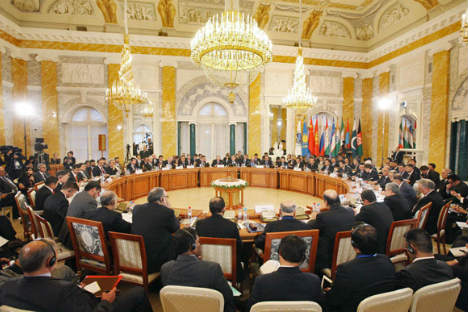SCO June summit: growing in numbers

The 10th prime ministers' meeting of the Shanghai Cooperation Organization (SCO) was held in St. Petersburg, Russia, Nov. 7, 2011. Source: AFP/East-News
On May 11, foreign affairs ministers of the SCO countries agreed to unite their efforts in fight against external threats. Russia’s foreign minister Sergei Lavrov and his five counterparts from China, Kazakhstan, Kirgizia, Uzbekistan and Tajikistan agreed upon the agenda of the summit for the heads of the SCO states, which is to be held on June 6-7 in Beijing.
The whole range of programme documents is planned to be signed during the summit, notably, the Declaration of heads of SCO states on creating “the region of enduring peace and common prosperity”.
According to the Russian daily “Kommersant” quoting a source in the SCO Secretariat, “granting Afghanistan an observer status within the SCO is one of the key points of the declaration.”
Kabul applied for the status last April, and since then Russia has been keen on the SCO’s accepting the application the soonest possible. Moscow insists that without Afghanistan implementation of the SCO anti-drug strategy adopted last year will remain highly doubtful.
The SCO ministers discussed again the future of Afghanistan and the whole region after US and NATO’s military forces withdrawal from the country, which is planned to take place in 2014.
The second country whose application is to be approved in Beijing will be Turkey. Ankara has sought the status of a partner state on the SCO dialogue since October 21, 2011. Partner states are not entitled to take part in all SCO events and don’t have access to non-public documents of the organisation. At the same time, according to the SCO Secretariat, the Turkish government’s interest for this regional organisation means that the number of the world powers who recognise SCO as a serious player is growing.
Another important issue stated in the declaration draft is ABM defence. The declaration draft also contains a thesis on the SCO members “acting against military intervention in the affairs of the Middle East and North Africa states, forced transfer of power and imposing unilateral sanctions.”
The SCO members also express their willingness on joint defence from similar threats. Notably, the document says that SCO will “act against using information and communication technologies for undermining political, economic and social security of member states and will stop internet propaganda of terrorism, extremism and separatism ideas.”
At the same time, it’s not clear yet how exactly SCO is going to defend the interests of its member states. On May 11 meeting, Mr. Lavrov said that following the June summit the range of functions of the organisation will be “significantly enhanced”. However, granting the organisation military and defense functions is out of the question yet. Lavrov said: “Such measures as general secretary’s statements and calling the extraordinary session of the council of ministers or secretaries of the SCO security councils are being envisaged.”
But as the document is still on the stage of coordination, it couldn’t be ruled out that some additional functions will be present in the strategy of the further SCO development, which is still to be approved by heads of states.
The article is abridged and translated from Kommersant
All rights reserved by Rossiyskaya Gazeta.
Subscribe
to our newsletter!
Get the week's best stories straight to your inbox